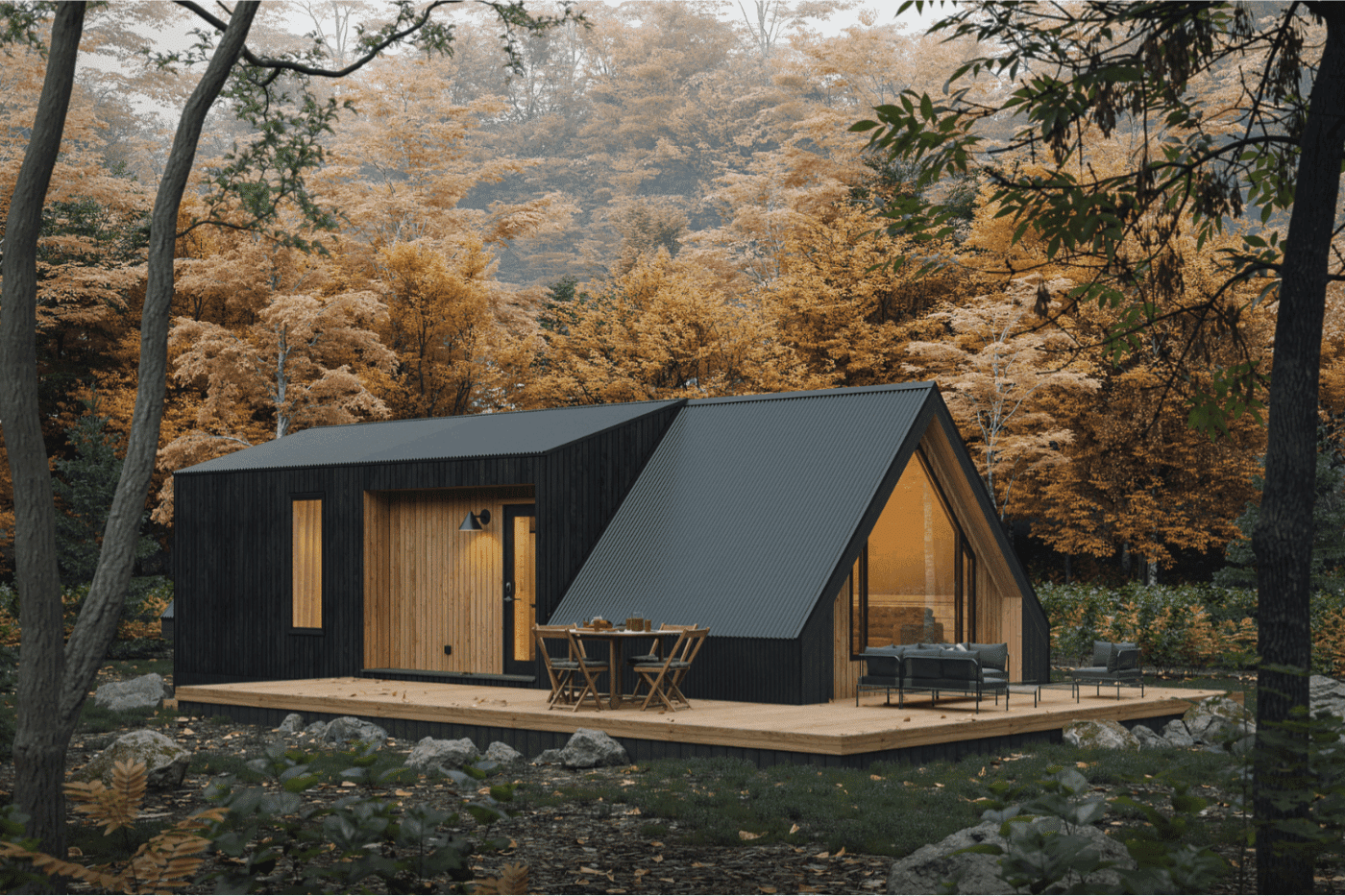DWELL BEYOND THE ORDINARY
Do ADUs Increase Property Value? What Homeowners Need to Know

If you recently purchased a beautiful ADU (Accessory Dwelling Unit) or are considering investing in one, you may be wondering if ADUs actually increase property value. In a housing market that is increasingly expensive, many homeowners are turning to ADUs as a way to boost their property value while benefiting from additional rental income. Yet, many confusing questions arise from investment returns to legalities. Don’t worry though, we are here to offer a clear guide on what you need to know as a homeowner about ADUs and property value, including permits, appraisals, rental income, and more. Let’s dive right in!
Do ADUs increase property value?
Absolutely! The answer to this pressing question is a resounding yes, although let’s break it down some more. On average, having a permanent ADU on your property will increase your property value anywhere from 20-30%, according to the National Association of Realtors. In certain housing markets like some areas of California, homeowners might expect to see an even higher return.
This is a significant percentage considering the relative affordability of a high-quality ADU model. If your housing market sells based on square footage, adding an constructed ADU can increase the property value greatly. For example, if the housing market in your area is selling for $400 per square foot and you have a 1,800 square foot home, your home will be appraised at $720,000. Adding a 500 square foot ADU would add an additional $200,000 to your property value in square footage alone, without even considering the potential rental income. Another way to calculate your increased property value is to multiply your property value by 20-30% to get another estimate. Either way, this means a legally permitted ADU can be an excellent investment for the value of your property!
Of course, there are many other factors that come into play when discussing permanent ADUs and property value. Below is a chart breaking down more critical factors.
| Factor | Description | Impact on Property Value |
| Permits/Legal Status | Paperwork that allows the ADU to be on the property | Necessary for increased property value |
| ADU Type | Detached ADUs are independent units while attached and conversion ADUs are part of the main dwelling while still having a private entrance. | Detached ADUs increase property value more than attached and conversion ADUs because of their privacy and extra space |
| Size and Design | Larger units with full bedrooms and bathrooms are more valuable | Larger units directly correlate to more square footage, boosting property value |
| Potential Rental Income | Monthly income adds income-based value potential | Has a much higher impact in urban areas like LA or other major cities |
| Local Market | High-demand urban and coastal areas have a greater ROI | Boosts property value in cities with a housing shortage |
| Zoning Regulations | Some areas restrict renting ADUs out or resale of ADUs altogether | Limited usage reduces buyer value perception. |
Helpful tip: Use our investment calculator to crunch the numbers on your potential ROI (Return On Investment) for your ADU!
Does having an ADU on my property make it challenging to sell my home?

It is unusual that investing in an ADU will make it more challenging for you to sell your home later. Typically, adding an ADU is a good investment for property value. In some rare cases or depending on certain current factors, it could make it more difficult although not impossible. Several things that always impact the general housing market are local market conditions, size and quality, and regulations.
- Local Market Conditions: The state of your local housing market always impacts how houses sell, with or without an ADU. If the market is in a bad place, it may be wise to wait to sell until the market quality improves.
- Size and Quality of the ADU: If the ADU is not designed well or has degenerated significantly in quality, it may be more difficult to sell the property due to perceived value lack.
- Regulations and Zoning Laws: We will discuss later the required permits for ADUs and how zoning can influence what type of ADU to purchase, but if the ADU on your property lacks the necessary permits, it will be difficult to sell. Lenders may not finance loans for unpermitted structures on a property, making it difficult to secure financing.
Can I Use The ADU On My Property To Produce Income?

One of the biggest appeals of a permanent ADU is the potential for rental income, particularly in areas with high average rent prices, like urban neighborhoods and cities. You could do this either in the form of long-term renting or short-term rentals like Airbnb.
Long-Term Rental
In many areas, with a legally permitted ADU, you have the option to rent out your ADU long-term which can be a consistent source of income for you.
The average national rent price for a 600 square foot ADU is around $1940 a month, and in some areas, significantly more, upwards of $3500 monthly. Whether you choose to rent out your property to strangers, family, or friends, having an ADU as a long-term rental is an excellent source of additional income.
Short-Term Rental
People are always traveling which means they need a place to stay. That’s where your beautiful ADU comes in as the perfect Airbnb or Vrbo short-term rental opportunity.
With the added convenience of your ADU being on your main property, you’ll be able to keep up with the maintenance, cleaning, and repairs that go into running an Airbnb. You can also use tools like AirDNA to help you calculate your potential rental income and ROI.
| Factor | Long Term Rental | Short Term Rental |
| Income | Consistent but lower monthly income | Sporadic but potentially higher monthly income |
| Management | Low effort and involvement | High involvement with cleaning, repairs, maintenance |
| Occupancy | Consistent, long-term renters | Renters dependent on seasons and demands |
| Regulations | Typically fewer regulations and restrictions | More permits, rules, and taxes |
| Flexibility | Lower (lease-bound) | Higher (block out certain times, adjust pricing as needed) |
Do ADUs Help Your Home Sell Faster?
An ADU is not always a guarantee for faster home sale investing in an ADU can translate to fast home selling in the future. This is due to several critical components.
1.) Increased Buyer Demand:
Many investors and local buyers are looking for properties with ADUs because of the incredible ROI they offer. Studies from Porch.com show that over 120,000 ADUs were built in 2020 alone, a number that is much higher today. People are realizing the benefit ADUs can have and they are looking for properties that already have ADUs on them, which could help your property sell faster.
2.) Higher Property Value:
As outlined at the beginning of this article, a well-constructed, legal ADU adds significant value to your property, which local buyers are interested in. They are looking for properties that will continue to increase in value, something that an ADU continues to do.
3.) Potential for Rental Income:
In the previous section, we explained how an ADU can be used as a great source of long-term rental income or short-term rental revenue. When investors or local buyers are considering your property, this potential source of rental income will be a huge drawing factor in the process, making it plausible your property will sell quickly.
How Do Appraisers Calculate ADUs Into The Value Of My Home?

Appraisers will typically value your property containing an ADU in one of three ways. They will either compare it to other properties with ADUs, consider the potential income sources, or go off of the cost. Let’s break each one down some more.
Comparable Sales
A skilled appraiser may choose to compare your property that has an ADU to other ADU properties then compare them to properties without ADUs. This is the most popular and widely preferred approach in the real estate world, but it requires other similar properties in the area. The “comps” that appraisers gather help them create a standard market-value that translates into how much they will appraise your house for. If you live in an area where ADUs are not yet popular, this appraisal approach may not be the best.
Income Approach
Another popular appraisal method is to value the ADU based on the net income it generates. The formula used is Net Operating Income (NOI) divided by capitalization rates. So if your ADU generates $15,000 of income a year and your local capitalization rate is 10%, your ADU would be valued at $150,000. Appraisers may use this method if your ADU is being used as a rental or investment property, but it is not as common as the comparable sales method.
Cost
The cost approach estimates how much it would cost to build the ADU today, then subtracts depreciation based on the unit’s age, condition, and design. This method is particularly useful when there are few or no comparable sales available.
For example, if your ADU is brand new and there are no nearby homes with similar additions, an appraiser may calculate the value based on what it would cost to construct your ADU from scratch—adjusted for wear and tear if it’s older. While not always as reflective of market demand as the comparable sales approach, the cost method provides a solid valuation benchmark in areas where ADUs are gaining popularity.
Note: Appraisers will also take into consideration external factors like views, neighborhood, condition of the house, lot size, and other related factors.
Does My ADU Need To Be Permitted To Increase My Property Value?
Yes, you will need to get permits for your ADU. Without gaining the proper permits before installing an ADU, you may run into additional fines and legal headaches later down the road. Additionally, if you try to sell a property that contains an ADU without permits, potential buyers might be scared off and you could lose property value.
Bottom line? Ensure your ADU is permitted in your local municipality!
Here are several permits your local municipality may require, although keep in mind there could be more or fewer depending on where you live.
Zoning
First things first, you must have a zoning permit. This permit ensures that an ADU is legally allowed on your lot. Zoning rules also regulate critical elements like minimum lot size, maximum ADU size, height limits, and whether the ADU can be used as a rental. Without zoning approval, you cannot move forward, regardless of your ADU’s design.
Building
Next up in the process is the building permit which covers all the structural components of the ADU. This includes the foundation, framing, roofing, insulation, windows, etc. You will need your plans reviewed by the city or town building department and inspections may be scheduled. While it seems like an additional headache, the building permit ensures your ADU tiny home safety and other factors like energy efficiency and structural support. No matter what kind of tiny home ADU you are purchasing or building, you will need a building permit.
Plumbing
The plumbing permit covers all water supply and drainage systems in the ADU. As mentioned earlier, you will need to arrange for a sewage connection for the ADU. Whether you’re tying into the main house’s water and sewer lines or installing separate utility connections, a plumbing permit is necessary. Inspectors will often require pressure tests and line inspections before the system can be approved.
Electrical
Because you will be hooking up the ADU tiny home to electricity, you will probably need to obtain an electrical permit for any electrical work inside the ADU or for the subpanels and connections to the main electrical line. Plus if you want to do any additional electrical wiring, you will need this permit to ensure your ADU is compliant with the National Electrical Code (NEC) and any local requirements. Depending on your design, you may be able to use a shared meter with the main house or install a separate one (required in certain states like California). Along with the permit, there may be several inspections before the ADU is approved.
On the other hand, a Zook Cabin ADU will come completely certified and permitted prior to delivery, allowing you to forego the headache of chasing down all the permits by yourself.
Will A Tiny Home ADU Increase The Value Of My Home The Same As A Permanent ADU?
In certain areas, you are not limited to a traditional permanent ADU with a foundation and can instead choose a park model tiny home to be used as an ADU. These tiny homes can be a great alternative to a traditional ADU although they do not usually increase the property value as significantly as a permanent ADU. They are ideal for short-term rentals and additional income, and homeowners can dive more into the details of what park model homes are, what they have to offer and how they can benefit you.
| Park Model Tiny Homes Vs. Permanent ADUs | |
| Park Models | Permanent ADUs |
| Permitted as an ADU only in certain areas that meet RVIA standards | Permitted in all areas that allow ADUs. |
| Viewed as personal property; tends to depreciate in value over time | Viewed as part of the real estate; appreciates over time like a traditional house |
| May be limited by zoning requirements for long-term living or short-term rental use | Designed for full-time living or rentals |
| More compact and movable | Permanently installed and larger |
Conclusion
We hope that this guide to ADUs and property value has been helpful to you as a homeowner when considering the steps forward. ADU can be an excellent investment into boosting property value plus offer an additional income source through short-term rentals. If you are considering purchasing an ADU, Zook Cabins is thrilled to help you on your journey. We provide you with high-quality, beautifully designed ADUs, engineered to your local residency codes. Contact us today or get a free quote to start the process!
